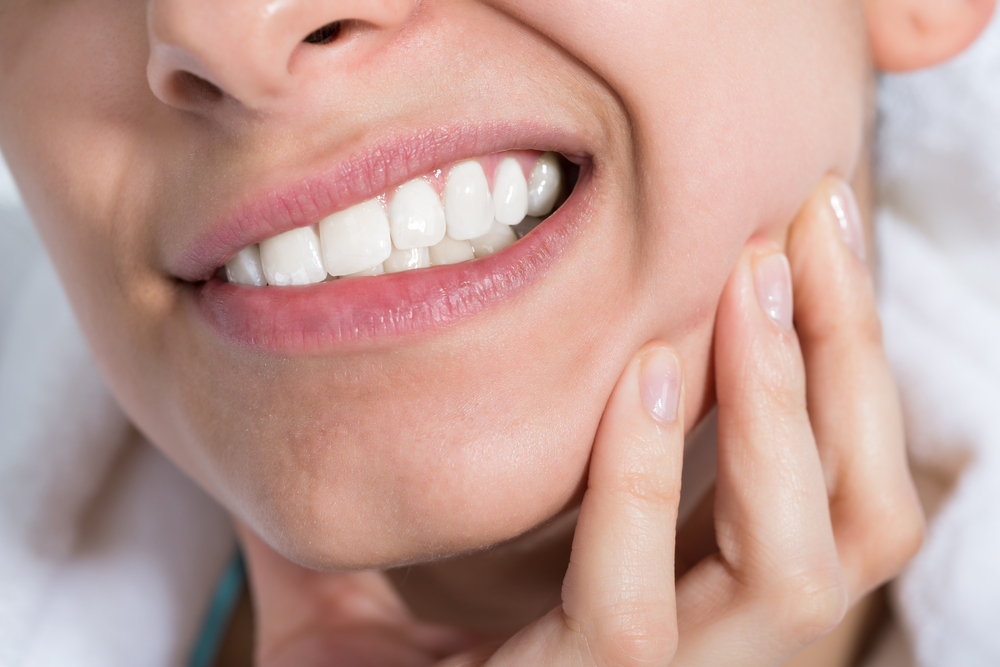
Painful gums can indicate periodontal disease. But there are other signs to look out for as well.
Periodontal disease progresses so gradually that most patients don’t realize their gums are in trouble until it’s too late. But one common characteristic of advanced gum disease is pain.
Gum disease pain manifests as either a dull ache or a sharp pain in the gums. In fact, one study found periodontal disease pain is a major source of orofacial discomfort. Yet periodontal disease also causes various other symptoms besides pain. Because early detection can reverse gum disease at its initial stage, knowing how to identify the signs can stop the pain quickly and return your gums to health.
What causes periodontal disease and its symptoms?
The primary cause of periodontal disease is poor oral hygiene. Every day, bacteria and plaque attach to your teeth. Daily brushing and flossing keep the amount of bacteria and plaque minimal. But if bacteria and plaque continue to grow due to poor oral hygiene habits, hardened tartar forms along the gum line. Tartar and the bacteria attached to it then infect and weaken the gum tissue and bone that secure the teeth.
While neglecting your oral health ranks as the top cause of periodontal disease, you may be at risk if you smoke, have dry mouth, or suffer from a chronic disease such as diabetes. Some people may also have a genetic predisposition for gum disease.
The earliest stage of gum disease is known as gingivitis. During this stage, bleeding, tender, and swollen gums are common. Because gingivitis has not yet affected the bones, it’s highly curable.
More advanced periodontal disease often leads to pain when chewing, sensitivity to hot and cold, gum recession, and loose teeth. As gums become more inflamed and infected by the overgrowth of bacteria, you may have bad breath and an unpleasant taste in the mouth. At this point, the gums and bone supporting the tooth may become so damaged a tooth may fall out.
But advanced gum disease may not only affect your oral health. Periodontal disease has been linked to heart disease and sepsis, a severe blood infection. Therefore, treatment is essential to stop its progression.
How is gum disease treated?
The Centers for Disease Control and Prevention estimates nearly half of all adults over 30 have some form of gum disease, making it one of the most common threats to oral health in the U.S. To diagnose gum disease, your dentist will ask about your symptoms and examine your gums. They will likely check for a gap between the gum line and the tooth. A gap larger than three millimeters indicates gum disease.
Gingivitis can be treated with deep cleaning called scaling and root planing, which remove the bacteria and plaque from the gums and the tooth’s root.
While more advanced forms of periodontal disease cannot be reversed, you can manage the condition with different treatments, such as gum and bone grafts, to replace lost gum tissue and bone. An artificial membrane inserted between the gums and the bone graft can also boost bone growth.
Prevent gum disease!
Gum disease is a very preventable condition. All it takes is good oral hygiene practices, such as the following:
Brush and floss daily. Brushing and flossing remove most of the damaging bacteria and plaque on your teeth.
Limit sugars and starch. Sugary, starchy foods promote bacterial growth. Limit those foods, or brush immediately after if you indulge.
Stop smoking. Tobacco is not only bad for your heart and lungs but can also have a devastating impact on your gums. It can also make healing from oral treatments more difficult.
Visit your dentist regularly. Twice-yearly dental checkups allow your dentist to assess your gum health and start treatment as soon as possible. When caught early, gum disease can be reversed.
Keep your gums healthy
Schedule an appointment at Espire’s La Mesa location today! Our highly trained dentists have years of experience treating all stages of periodontal disease. We can guide you through the process of reversing gingivitis or managing periodontitis. Don’t live near our La Mesa, CA office? Find one of our other locations near you.
La Mesa, CA
8555 Fletcher Parkway
Suite 102
La Mesa, CA 91942
